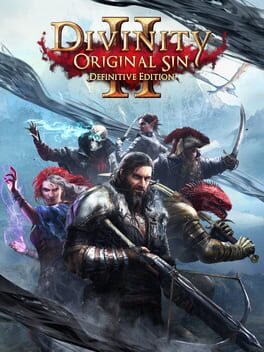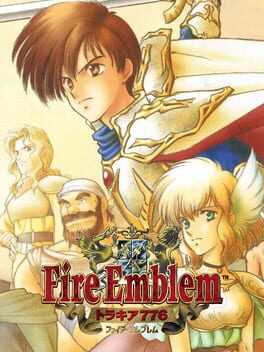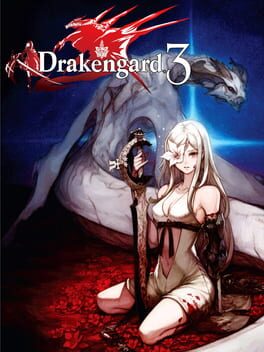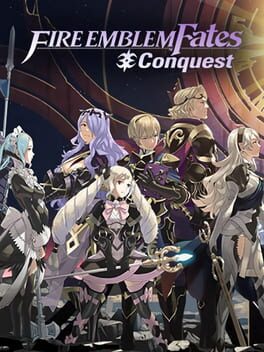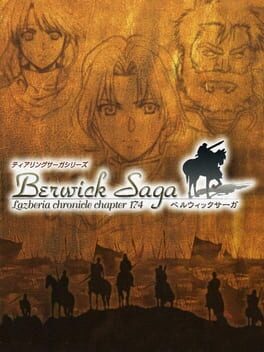Tsunny
The game says it's cozy and means it, and it's not just that way in a shallow cheap comfort. It balms a lot of aches that come with being human, alive, existing, and how well it speaks to it. It makes being an NPC, something we essentially all are in others' lives, directly rewarding. There's something that lots of folks should learn from that, truthfully. Everyone's got something going on you don't always know about, but telling the truth, doing your best to live without regrets, and being emotionally vulnerable and there for people will always get you to somewhere you want to be in life.
Played through as Player Sebille, romanced Lohse.
My biggest problem with this game is the fact it drops the ball in terms of pacing for its last "half" (two acts, about a third of the game length-wise).
Everything else is stellar. The mechanics are satisfying, easy to understand, and have legitimate depth. Spells that offer utility always are more than they seem on the surface, and that's fun design. I wish the party felt less oriented towards the player character and exclusively them, but there's enough life I could look past it.
Also, explicit queerness is nice to see!
My biggest problem with this game is the fact it drops the ball in terms of pacing for its last "half" (two acts, about a third of the game length-wise).
Everything else is stellar. The mechanics are satisfying, easy to understand, and have legitimate depth. Spells that offer utility always are more than they seem on the surface, and that's fun design. I wish the party felt less oriented towards the player character and exclusively them, but there's enough life I could look past it.
Also, explicit queerness is nice to see!
2017
"Can an android be an android? Can an android be human? Can a human be human? What does it mean to be human?"
It means that even if it's pointless, you still have to do it. You fight and get back up because you believe you can overcome some day.
NieR Automata is a game about finding meaning in a world that is devoid of it. It's also a game about making life, mecha battles, and fishing.
10/10 A2 is peak fiction, such a compelling character in a world she doesn't even feel she belongs in half the time. Not in a "this character is better written than the medium" thing she just explicitly doesn't fit in.
It means that even if it's pointless, you still have to do it. You fight and get back up because you believe you can overcome some day.
NieR Automata is a game about finding meaning in a world that is devoid of it. It's also a game about making life, mecha battles, and fishing.
10/10 A2 is peak fiction, such a compelling character in a world she doesn't even feel she belongs in half the time. Not in a "this character is better written than the medium" thing she just explicitly doesn't fit in.
2006
What if a game just made you feel things, a lot.
What if a game made you miss things you never even had, but you can feel their absence and want that back.
Mother 3 evokes a sense of nostalgia and need for ideas of simplicity, but it doesn't point and say "look! we should go back to that!" it's an acknowledgement of the loss, and saying "it's okay to miss it and desire it, but you also have to grow around what is required of you."
It's a good piece of art. The input delay for the rhythm battling on Nintendo PC can be a little awkward, but... it's not necessary to beat the game.
What if a game made you miss things you never even had, but you can feel their absence and want that back.
Mother 3 evokes a sense of nostalgia and need for ideas of simplicity, but it doesn't point and say "look! we should go back to that!" it's an acknowledgement of the loss, and saying "it's okay to miss it and desire it, but you also have to grow around what is required of you."
It's a good piece of art. The input delay for the rhythm battling on Nintendo PC can be a little awkward, but... it's not necessary to beat the game.
Thracia doesn't play fair. You don't play fair with Thracia. In this equilibrium, there is balance.
The story of Thracia mostly serves to expand on a segment of FE4, but this is a weird little game with a lot of charm on its own. Everything is smaller scale, and it's about the people along the way more than anything.
Thracia has a lot of weird mechanics, most of them charming. It's in many ways a character builder, but stats also matter very little. It lets you indulge in aesthetic pleasures, and do frankly silly things.
The story of Thracia mostly serves to expand on a segment of FE4, but this is a weird little game with a lot of charm on its own. Everything is smaller scale, and it's about the people along the way more than anything.
Thracia has a lot of weird mechanics, most of them charming. It's in many ways a character builder, but stats also matter very little. It lets you indulge in aesthetic pleasures, and do frankly silly things.
2013
I'll beat the ending some day. Have looked it up before but it just beats me.
Drakengard 3 is likely not Taro's best work, objectively. It is, despite that, distinctly emotionally resonant.
Zero hates herself and wants to die more than she wants to live. She wants everything to end on her own terms, because she needs control like humans need air. She has only ever trusted one person, and he died. She's all sorts of terrible, has little empathy, continually hurting everyone around her. She is still deserving of empathy, and understanding.
Drakengard 3 is about loss. It's about always reaching out and trying to be honest with yourself and others, because that's what it means to be alive, no matter how hard it is. It's about putting your trust in people, even when it feels impossible. It's about what happens when you succumb to the worst parts of yourself. It's about needing someone who understands you. It's about what love does to someone, good and bad. It's about how obsession rends everything you cared about apart. It's about how you have to stare yourself in the eye, unflinching, and realize you have made mistakes. It's about how obsession with worldly pleasure rather than legitimate connection will make life not worth living.
Drakengard covers so many things, there's so much in this game that hurts. There is an undeniable amount of content that I do not blame people for being unable to stomach. It will throw you against the wall, take you for all you're worth, drag you back up, and ask you to keep going. Until you know why you should keep going. Until you understand it. Because the world we live in is worth fighting for.
Drakengard 3 is likely not Taro's best work, objectively. It is, despite that, distinctly emotionally resonant.
Zero hates herself and wants to die more than she wants to live. She wants everything to end on her own terms, because she needs control like humans need air. She has only ever trusted one person, and he died. She's all sorts of terrible, has little empathy, continually hurting everyone around her. She is still deserving of empathy, and understanding.
Drakengard 3 is about loss. It's about always reaching out and trying to be honest with yourself and others, because that's what it means to be alive, no matter how hard it is. It's about putting your trust in people, even when it feels impossible. It's about what happens when you succumb to the worst parts of yourself. It's about needing someone who understands you. It's about what love does to someone, good and bad. It's about how obsession rends everything you cared about apart. It's about how you have to stare yourself in the eye, unflinching, and realize you have made mistakes. It's about how obsession with worldly pleasure rather than legitimate connection will make life not worth living.
Drakengard covers so many things, there's so much in this game that hurts. There is an undeniable amount of content that I do not blame people for being unable to stomach. It will throw you against the wall, take you for all you're worth, drag you back up, and ask you to keep going. Until you know why you should keep going. Until you understand it. Because the world we live in is worth fighting for.
Story wise, this game has very little compelling for it. It's Fire Emblem: Fates.
However, mechanically, it's a master class.
The pair up system returns from Awakening, refined, tuned tighter, much less random, and with incredible depth. The beauty of Conquest is in the systems, how intelligently the player and the AI can use them to create good challenges.
The game feels very tightly designed, even with Fire Emblem's disposition towards random growths for progression gains, because what matters more is skills. Skills represent guaranteed progression, as long as you can access the classes that have the ones you want.
Accessing classes is done through the support system, and unfortunate monogamy (both literal and mechanical) aside, optimizing gains and routing class hopping is enjoyable to theorycraft, then execute. Some characters are doozies, while others (Nyx, Beruka, Niles) have some legitimate charm to them that makes them almost feel wasted in this narrative.
Is this a good game to play through the story for? Heavens, no. Is it a good game to play, if the mechanics interest you? Absolutely.
However, mechanically, it's a master class.
The pair up system returns from Awakening, refined, tuned tighter, much less random, and with incredible depth. The beauty of Conquest is in the systems, how intelligently the player and the AI can use them to create good challenges.
The game feels very tightly designed, even with Fire Emblem's disposition towards random growths for progression gains, because what matters more is skills. Skills represent guaranteed progression, as long as you can access the classes that have the ones you want.
Accessing classes is done through the support system, and unfortunate monogamy (both literal and mechanical) aside, optimizing gains and routing class hopping is enjoyable to theorycraft, then execute. Some characters are doozies, while others (Nyx, Beruka, Niles) have some legitimate charm to them that makes them almost feel wasted in this narrative.
Is this a good game to play through the story for? Heavens, no. Is it a good game to play, if the mechanics interest you? Absolutely.
2022
Oh... Elden ring...
Elden Ring is host to a lot of incredible things. It can struggle with the overwhelming amount of "world" that isn't always of excelsior quality, but it's always at least "good enough" which is an important benchmark.
The world is fun to poke around in your first time, and it's been equitably charming and more enjoyable to poke around with extra knowledge on my second character, because there's less directionless feeling. That feeling is incredible your first run, the sense of wonder alone giving reason to explore.
Like most of the FromSoft games, Elden Ring shines because of its cast of NPCs that breathe life into an otherwise sullen world, and this is potentially the best cast we've ever seen. Everyone has their purpose, they feel like finely honed narrative tools in service of communicating something to the player.
There's a lot of legitimately incredible ugly feelings explored by the game, whether through metaphor or a depiction of them. It's rather beautiful, the way some of them are born from the metaphorical (or literal) mud and rot from the world, and later flourish, not unlike a lotus.
The beauty in a world that is broken is in those who have slipped through the cracks and survived, and want a world where others won't experience that same pain. Elden Ring is full of people who, despite everything, are pushing for something. Even if it will end terribly, in true NPC fashion, you carry them with you, and that is what matters.
Elden Ring is host to a lot of incredible things. It can struggle with the overwhelming amount of "world" that isn't always of excelsior quality, but it's always at least "good enough" which is an important benchmark.
The world is fun to poke around in your first time, and it's been equitably charming and more enjoyable to poke around with extra knowledge on my second character, because there's less directionless feeling. That feeling is incredible your first run, the sense of wonder alone giving reason to explore.
Like most of the FromSoft games, Elden Ring shines because of its cast of NPCs that breathe life into an otherwise sullen world, and this is potentially the best cast we've ever seen. Everyone has their purpose, they feel like finely honed narrative tools in service of communicating something to the player.
There's a lot of legitimately incredible ugly feelings explored by the game, whether through metaphor or a depiction of them. It's rather beautiful, the way some of them are born from the metaphorical (or literal) mud and rot from the world, and later flourish, not unlike a lotus.
The beauty in a world that is broken is in those who have slipped through the cracks and survived, and want a world where others won't experience that same pain. Elden Ring is full of people who, despite everything, are pushing for something. Even if it will end terribly, in true NPC fashion, you carry them with you, and that is what matters.
Berwick Saga is... Berwick. The game is beyond weird, unreliable, finicky, actively hostile, slow, annoying, and I wouldn't have it any other way.
The story and world are very well crafted, but you are expected to do a LOT of reading. Not as much as TRS in some parts, but there's some very dialogue heavy moments.
The game excels in making every playthrough unique, because nothing will ever happen the same way twice, no matter how much you beg for it to do so. Every unit has a niche, is legitimately usable if not viable at endgame with minimal investment, and the weapon system, while occasionally irritating, serves as a good method of progression. Everyone has their moment in the sun. Even Adel.
Story wise, a lot of the characters fall into common tropes, especially in Kaga's body of work. There are some subversions, some are played straight, but all of them feel in some way, distinctly human. That is where Berwick Saga shines, that sense of humanity and dignity everyone receives.
Of course, this is less for some women, notably Christine, and to a lesser extent Sylvis, in how they're treated, but those are minor nitpicks (and let's be honest, if you're playing this, you can stomach Kaga's misogyny.)
But that doesn't take away from the fact that this is probably Kaga's best story about humanity, because of the setting. It's victim to a lot of his writing quirks, for better and for worse, but mechanically and narratively this game is satisfying. Just be patient, and it will reward you with a fantastic time.
The story and world are very well crafted, but you are expected to do a LOT of reading. Not as much as TRS in some parts, but there's some very dialogue heavy moments.
The game excels in making every playthrough unique, because nothing will ever happen the same way twice, no matter how much you beg for it to do so. Every unit has a niche, is legitimately usable if not viable at endgame with minimal investment, and the weapon system, while occasionally irritating, serves as a good method of progression. Everyone has their moment in the sun. Even Adel.
Story wise, a lot of the characters fall into common tropes, especially in Kaga's body of work. There are some subversions, some are played straight, but all of them feel in some way, distinctly human. That is where Berwick Saga shines, that sense of humanity and dignity everyone receives.
Of course, this is less for some women, notably Christine, and to a lesser extent Sylvis, in how they're treated, but those are minor nitpicks (and let's be honest, if you're playing this, you can stomach Kaga's misogyny.)
But that doesn't take away from the fact that this is probably Kaga's best story about humanity, because of the setting. It's victim to a lot of his writing quirks, for better and for worse, but mechanically and narratively this game is satisfying. Just be patient, and it will reward you with a fantastic time.

